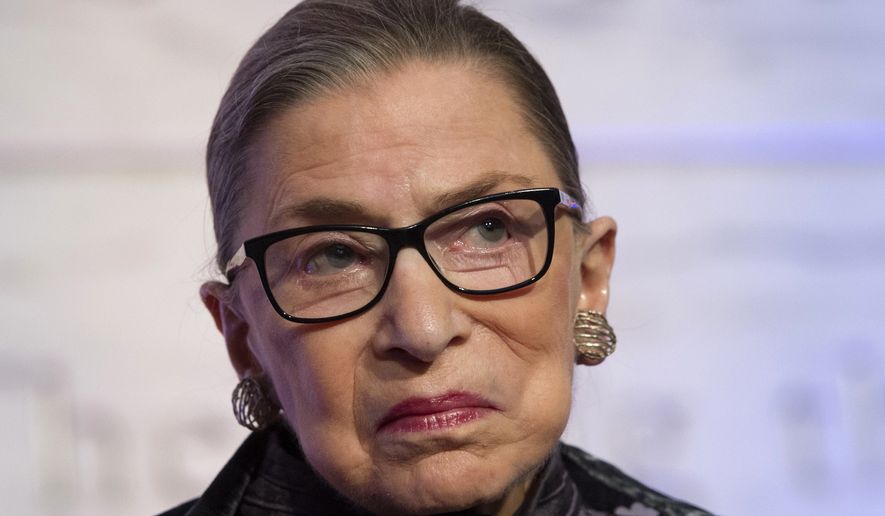OPINION:
Ruth Bader Ginsburg has always had difficulty getting over herself. She has opinions on many things, and when she’s not speaking ex-cathedra, as it were, she’s eager to express those opinions elsewhere, as if the public were waiting breathlessly for them. Lately she has even been forgetting her place.
Everybody has his (or her) opinion of both Donald Trump and Hillary Clinton, and many male and female are on the scout for an occasion to air it out. Mrs. Ginsburg’s opinion of the Donald will not surprise anyone, given the fact that she is perhaps the most liberal member of the U.S. Supreme Court, but what surprised everyone, Democrat and Republican, is that Mrs. Ginsburg upsets custom to involve herself in a presidential election. In the past that has been a no-no.
“I can’t imagine what [the Supreme Court] would be, I can’t imagine what the country would be, with Donald Trump as our president,” she told The New York Times earlier this week. “For the country, it could be four years. For the court, it would be — I don’t even want to contemplate that.”
When the Donald did not shrivel up and blow away, she went further, calling him “a faker,” and endorsed Hillary Clinton. With that, some of her friends in the legal and political establishment, including learned law professors, cringed. So did several senators, both Democrats and Republicans.
“Her comments … call into question her ability to adjudicate any case involving the Trump administration [if there is one],” says Josh Blackman, a professor at the South Texas College of Law. “I say this as someone who largely agrees with her prognostications of what a Trump presidency would mean. She needs to stop.”
Several senators agreed. “We all know that justices on the Supreme Court have political views,” says Sen. Chris Murphy of Connecticut, a Democrat. “I’m not sure we’re well-served by them airing them out in the open.”
Sen. Dick Durbin of Illinois, the Democratic whip in the Senate, says, “She may have got out over her skis a little bit and [been] more forthright and political than she should have been. It’s very unusual.”
It’s hardly unprecedented for Supreme Court justices to express opinions off the bench. Mrs. Ginsburg’s closest friend on the court, the late Antonin Scalia, did it. So has Clarence Thomas. But Mrs. Ginsburg went into full-throated campaign mode, as if she were the designated Democratic attack dog, a role usually left to a vice presidential candidate. Some Democrats put it down to Mrs. Ginsburg’s age, though she is only 83, early to reach her sell-by age.
“It’s an open question whether or not a sitting justice should be having that opinion,” says Sen. Brian Schatz of Hawaii, a Democrat. “It’s [an opinion] I agree with. If it’s not over the line, it’s very close to the line.” Sometimes, says Sen. Jon Tester of Montana, another cringing Democrat, “you just can’t stop when they say stupid stuff.”
But if Mrs. Ginsburg were merely a judge on a lesser appeals court she could expect to be reprimanded for violating the Code of Conduct for United States Judges, which sets out that “a judge should not … publicly endorse or oppose a candidate for public office.” Supreme Court justices are not legally bound to those standards, though they usually say they adhere to them.
Everyone expects a justice like Mrs. Ginsburg to exercise judicial restraint, and save her passionate political opinions for her bridge circle.




Please read our comment policy before commenting.